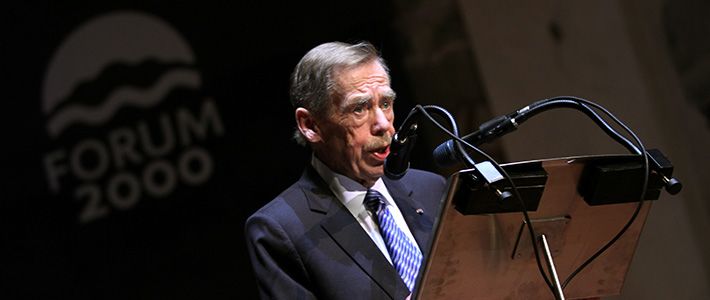
Forum 2000 (Part One)
Society Culture- English
- 日本語
- 简体字
- 繁體字
- Français
- Español
- العربية
- Русский
The city of Prague has played an important role in European history, from the fourteenth century, when it was the capital of the Holy Roman Empire, to recent times, when it became the stage for the Prague Spring (1968) and the Velvet Revolution (1989) uprisings against communism. Today, the Czech capital plays host to the annual Forum 2000 international conference, the most recent of which was held October 9–11, 2011.
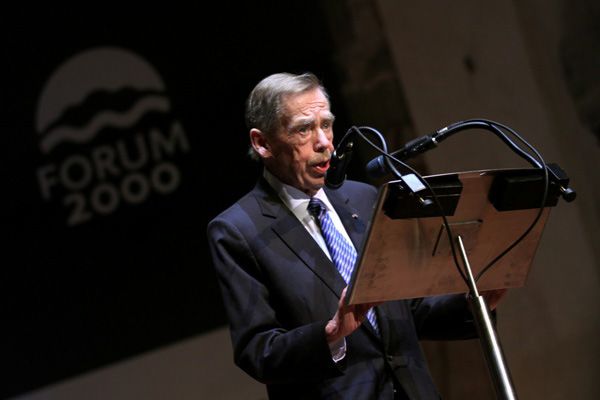 Václav Havel speaking at the opening of Forum 2000 in Prague last October. (Photo: Forum 2000 Foundation)
Václav Havel speaking at the opening of Forum 2000 in Prague last October. (Photo: Forum 2000 Foundation)
Forum 2000 was founded in 1997 at the initiative of three men: former Czech President Václav Havel (1936–2011); holocaust survivor Elie Wiesel, winner of the 1986 Nobel Peace Prize and author of Night (a first-hand account of life in a Nazi concentration camp); and Sasakawa Yōhei, chairman of the Nippon Foundation. The initial impetus was a discussion that took place during the December 1995 conference "The Future of Hope" in Hiroshima, in which Havel and Wiesel agreed on the need for a forum to discuss global issues and the future of humanity.
Established as a platform for dialogue among world leaders and thinkers, Forum 2000 aims to identify the key issues facing human societies and to prevent the escalation of conflicts stemming from religious, cultural, or ethnic tensions. Through its activities, it seeks to promote democracy in non-democratic countries and to support civil society, human rights, and religious, cultural, and ethnic tolerance in fledgling democracies. The Forum 2000 Conference has attracted many distinguished participants, including former US President Bill Clinton, former German President Richard von Weizsäcker, the Dalai Lama, and South African activist Archbishop Desmond Tutu.
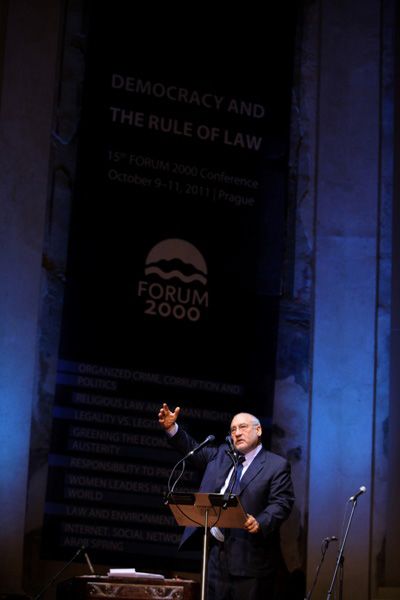 American economist Joseph Stiglitz at the Forum 2000 Conference. (Photo: Forum 2000 Foundation)
American economist Joseph Stiglitz at the Forum 2000 Conference. (Photo: Forum 2000 Foundation)
In October 2011, Forum 2000 held its fifteenth annual conference, organized around the theme of "Democracy and the Rule of Law." Among the participants were Prince El Hassan bin Talal of Jordan, President Mikheil Saakashvili of Georgia, former president of Nigeria Olusegun Obasanjo, American economist Joseph Stiglitz, and Japanese scholars Itoh Motoshige (economics) and Fujiwara Kiichi (international politics), both of the University of Tokyo.
A Spiritual Davos
Although Forum 2000 encourages dialogue on wide-ranging economic and political issues, its main emphasis is on building the moral and ethical foundations for the long-term survival of human societies. In a world of excesses that humanity seems helpless to control, Havel believed it was vital for thinking people to assert a "moral minimum" to stem the decline of personal, social, and national morals. Indeed, Havel sometimes called Forum 2000 a "spiritual Davos," in reference to the World Economic Forum, the Geneva-based organization that holds its annual meetings in Davos, Switzerland. Whereas the Davos meeting focuses on economic and political issues, Havel believed that Forum 2000 should concern itself with issues pertaining to the human spirit. For this reason, the forum has also provided a setting for interfaith dialogue, encouraging religious leaders to reaffirm basic human values transcending sectarian differences.
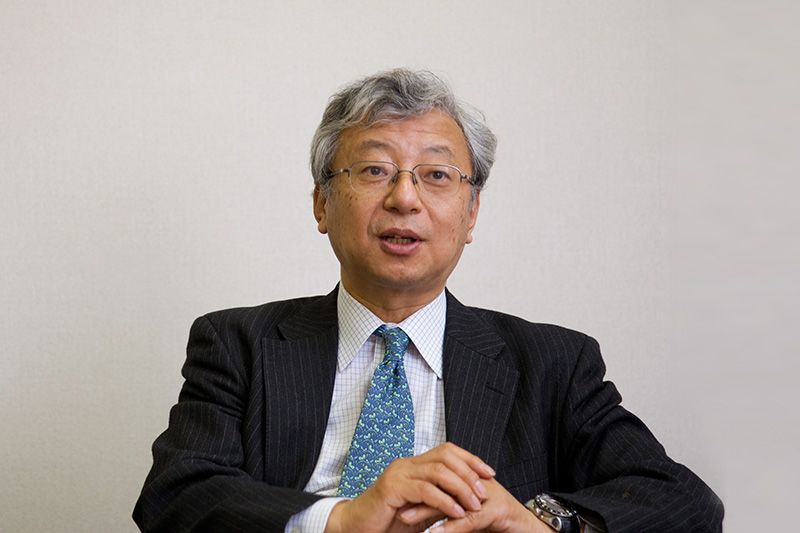 Economist Itoh Motoshige, a participant in last October's Forum 2000 Conference. (Photo: Katō Takemi)
Economist Itoh Motoshige, a participant in last October's Forum 2000 Conference. (Photo: Katō Takemi)
As a first-time attendee, Itoh Motoshige, a professor of economics at the University of Tokyo, was immediately struck by the distinctive atmosphere of the Forum 2000 Conference. "When Joseph Stiglitz mentioned his involvement in the 'Occupy Wall Street' movement, a number of people in the audience cheered. From that I knew right away how different the conference was from Davos!"
Havel's Last Letter to Aung San Suu Kyi
As a dissident under Czechoslovakia's repressive Communist regime, Václav Havel spent years in prison before eventually helping to usher in democracy as leader of the bloodless 1989 Velvet Revolution. Havel always made a point of offering leaders and thinkers living under oppressive political or social systems worldwide an opportunity to express themselves on the subject of freedom and democracy.
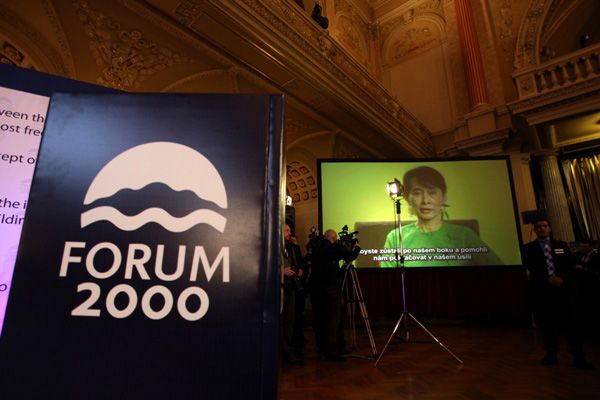 Aung San Suu Kyi addresses Forum 2000 in a videotaped message. (Photo: Forum 2000 Foundation)
Aung San Suu Kyi addresses Forum 2000 in a videotaped message. (Photo: Forum 2000 Foundation)
This is why Forum 2000 issued an invitation each year to Aung San Suu Kyi, even though she remained under house arrest for her opposition to the military government in Myanmar (Burma). Last year, following her release in November 2010, Suu Kyi was finally able to participate in Forum 2000 via a videotaped message. After watching the video on the second day of the conference, Havel handed a letter to Sasakawa Yōhei to pass on to Suu Kyi. It was to be Havel's last missive in a correspondence that began shortly after he recommended Suu Kyi for the Nobel Peace Prize in 1991.
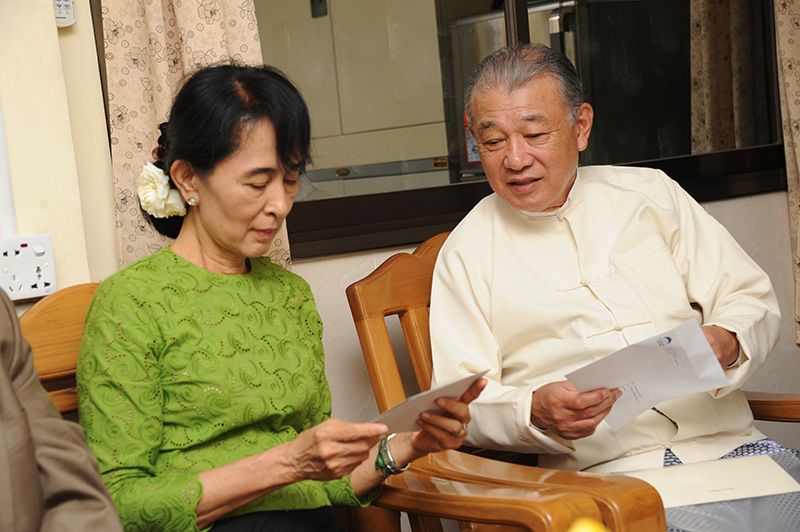 Nippon Foundation Chairman Sasakawa Yōhei giving Aung San Suu Kyi the letter Havel wrote to her shortly before his death. (Photo: Nippon Foundation)
Nippon Foundation Chairman Sasakawa Yōhei giving Aung San Suu Kyi the letter Havel wrote to her shortly before his death. (Photo: Nippon Foundation)
Václav Havel died on December 18, 2011, at the age of 75. On the very day of Havel's death, Sasakawa arrived in Yangon to visit his old friend Suu Kyi and deliver the letter Havel had entrusted to him. He kept his promise a few days later. Suu Kyi's "Letter from Burma" printed by the Mainichi Shimbun the following month (January 30, morning edition), contained the following quotation from Havel’s letter: "Over the years I sent you a number of letters inviting you to attend various international conferences and other events that I organized. I did it being perfectly aware that the chances of you attending are non-existent but I still did it out of principle and to remind the authorities that confiscated my letters to you that we constantly think of you and support you."
A Unifying Symbol
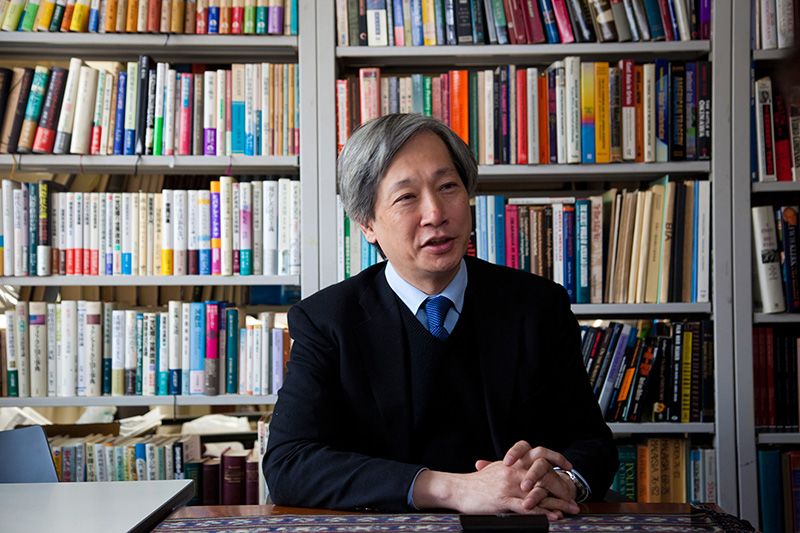 Forum 2000 participant Fujiwara Kiichi. (Photo: Katō Takemi)
Forum 2000 participant Fujiwara Kiichi. (Photo: Katō Takemi)
What will become of Forum 2000 without Václav Havel? Fujiwara Kiichi, who took part in last year’s forum, had this to say: “Havel’s death is certainly a blow. If the Czech Republic moves away from Havel’s ideals, the forum will probably cease to exist. But from what I could gather in Prague, Havel was a unifying symbol, bringing people together. Even though he’s gone, I believe Forum 2000 will carry on.”
(Read our interview with Fujiwara Kiichi in Forum 2000 [Part Two].)
Aung San Suu Kyi Democracy Itoh Motoshige Forum 2000 Czechoslovakia Czech Republic Prague Václav Havel Sasakawa Yōhei Elie Wiesel rule of law Joseph Stiglitz Fujiwara Kiichi morality moral